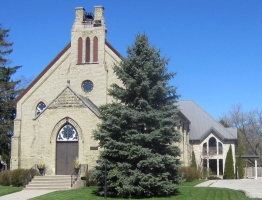



|
| For a printable PDF of this policy Click Here |
DORCHESTER UNITED CHURCHINVESTMENT POLICYPreface As a requirement of the Congregational Board of Trustees Handbook, published in 2004, the task of managing investments has been assigned to the Board of Trustees. In governing how the Trustees manage the investments of the charge, the laws of Ontario (Ontario Trustee Act) use the "prudent investor" rule which places a general duty on trustees to make reasonable investment decisions without undue risk. The guidelines set down in the Trustee's handbook specify that gifts, legacies, and such are to be decided by the Church Board whether the gift is to be invested or used immediately. If the gift is to be invested, the investment must be made in the name of the Trustees and the revenue used as the Church Board may direct.
If the gift is to be used immediately, it must be turned over to the
Treasurer with instructions from the Church Board as to its use.
Prudent Investor Approach to Investments In investing trust property, trustees must exercise the care, skill, diligence, and judgment that a prudent investor would exercise in making investments and may invest trust property in any form of property in which a prudent investor might invest. The Ontario Trustee Act sets out seven criteria that must be considered in planning the investments of trust property. They are:
Official Board Approval Although individual investment decisions are the responsibility of the Board of trustees, the investment policy should be considered and approved by the Official Board. Protection from Liability
STATEMENT OF OBJECTIVES
The investment portfolio will be managed in such a way as to optimize total
return as the key to the trust's long-term viability. The primary goal is
to provide a predictable stream of income growing in line with inflation,
while trying to grow the principal over time. The Trustees will target a
return objective to maximize return without taking undue risk as set out in
the investment policy. The preservation of capital from the proceeds of the
sale of the manse must be ensured. The maintenance of an adequate level of
liquidity to meet anticipated funding requirements are necessary, as well
as maximizing long term growth.
To ensure these objectives and goals are satisfied, the Board of Trustees will report at least annually to the Church Board. Monthly statements will be forwarded to the Treasurer for review.
Liquidity
Except for investment purposes and periodic payment of accumulated income,the fund requires a liquidity capability that meets the requirements of the Church Board. INVESTMENT POLICYThe trust fund should be structured using asset allocations structured to meet the requirements of income and long-term growth and satisfying the risk tolerance established within this document. The portfolio must allow for flexibility to react to changing economic, business and investment market conditions. A long-term discipline approach must be promoted to discourage random revisions based on panic, emotion or overconfidence. Asset Class Characteristics The portfolio will combine asset classes in such a way as to provide the highest expected return for a given level of risk. Economic conditions, changes in interest rates, and price inflation will be considered as part of the asset class allocations. Investment Guideline
Equities: 0% to 50%: Fixed Income: 50% to 100%: Cash: 0% to 30% Return Objectives The return objectives can only be pursued in accordance with the designated tolerance for risk. As there will always be some degree of uncertainty concerning the amount and pattern of future investment returns, investors must know how much certainty they are willing to sacrifice in exchange for the promise of higher returns. To distinguish between longer-term realities, short-term risk can be thought of as how often, and to what extent, you may experience a loss of capital over periods such as a few quarters of a year. In the long-term, risk is the possibility that growth and/or income generated by the portfolio may not meet your expectations, or more critically, your needs. In general, the greater the ability to assume short-term risks, the more likely that the assets will generate sufficient long-term growth and/or a higher average level of income. Time Horizon The trust fund's time horizon is long as the funds are expected to be invested in perpetuity. Geographical Orientation and Ethical Considerations Since we are living in a global economy, restrictions to specific countries need to be considered. It is acknowledged that the definition of "ethical" in the investment environment is highly subjective. With their responsibility of managing investments, the Board of Trustees will interpret the definition of unethical investments using the Social and Environmental Screening Criteria included in this document. Social and Environmental Screening CriteriaIntroduction: This document presents a set of screening criteria to be applied to Investments in the Portfolio. The criteria are designed to be practical enough to provide clear guidance to the Board of Trustees. The criteria are intended to honour the Church's desire to invest its funds in a manner consistent with its values and mission, as well as the fiduciary responsibilities of the members of the Board of Trustees. Dorchester United Church instructs the Board of Trustees to decline investment opportunities in the following categories at a minimum:
Companies that engage in these business activities, in a regular,
continuous and substantial basis are not to be considered.
The Church Board and the Congregation of the Dorchester United Church,through its planning process, may choose to allocate funds for investment purposes in support of the Congregation's Mission Statement commitment to social justice and The United Church of Canada policy with respect to corporate social responsibility, whereby funds may be directed to categories of investment considered to be more socially desirable than financially attractive. These decisions would be discussed with the Board of Trustees to determine their impact on the overall portfolio. Sunset Provision The Policy shall be reviewed jointly by the Board of Trustees and the Church Board at no longer than 5-year intervals. REFERENCES
2004 Original issue
2018 Revision No. 1
|